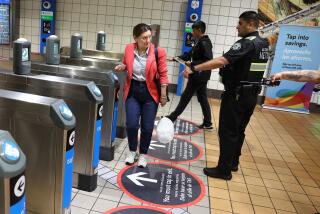Good Samaritan on the Blue Line
- Share via
I saw something yesterday. A cop was walking down the aisle of the Blue Line asking to see each rider’s pass, ticket or transfer when he came upon a sleeping Latino man. The cop woke the man, who looked dazed and confused. The man was dirty and covered with soot as if he had just came out of a coal mine. He was probably homeless, and he didn’t have his pass.
The sign said you could be fined $250 for riding the subway illegally. The cop gently pulled the Latino man to his feet and escorted him off the subway car. On the waiting platform, in view of everyone on the subway, the cop had the man lace his fingers together behind his back, and with his left hand, the cop held the man’s palms tightly together. Using his right hand, the cop searched the man’s pockets, throwing whatever he found on the floor.
As I watched this from my seat, I saw an old black man, who also looked homeless, leave his train seat and walk to the subway door. He threw out a piece of paper and quickly sat back down. The piece of paper landed behind the cop, who did not see it because he was too busy emptying pockets. As cigarettes, matches, a comb, a couple of bills, and pieces of folded-up paper fell to the floor, I suddenly realized what the black man had done. He had given his pass to the Latino. Soon afterward, another cop came by. While looking through the pile of junk on the ground, he found the subway ticket. After the two cops held a short conversation, they let go the Latino man, who looked bewildered and did not seem to know what just happened.
I thought about this incident on the ride home. Why did the black man do it,? I wondered. He did not seem to know the Latino, and yet he risked getting caught to help him. He certainly was a good Samaritan. As I pondered this, I began to understand the motives in that biblical story.
The good Samaritan gives the thirsty man a drink not out of pity but empathy. Empathy, I think, is a much nobler motive than pity. When you empathize, you see the situation through the eyes of the man you help. When you pity, you look down on him.
I also realized how rare an act of empathy is nowadays. With a widening gap between the economic classes, it is harder and harder for one group to understand what the others are going through. Richer people are building their homes further and further away from poorer people. And with a car, it is quite possible for someone living in Westminster to go to work every day at UCLA without ever seeing a person from East L.A. or Compton or Watts.
I like to think that the black man empathized with the Latino. Perhaps he too once rode the subway without a ticket and was caught, and he knew what it felt like to pay a $250 fine. Whatever his motives were, he did a good deed, and it is worth remembering.
More to Read
Sign up for Essential California
The most important California stories and recommendations in your inbox every morning.
You may occasionally receive promotional content from the Los Angeles Times.













